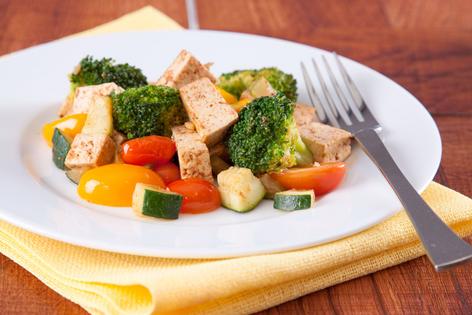Environmental Nutrition: Shining the light on plant proteins
More and more people are putting plant proteins -- beans, lentils, peas, soyfoods, nuts, seeds and whole grains -- at the center of the plate. According to research conducted by Midan Marketing and MeatingPlace, 70 percent of meat eaters in the U.S. are substituting a non-protein meal at least once a week, and 22 percent say they are doing it more often than a year ago. Why are plants soaring? Health benefits and environmental benefits are at the top of the list of reasons why consumers, from vegetarians to omnivores, are swapping out animal proteins for plant proteins.
Health power in the plant
Research has linked plant-based diets with lower risks of heart disease, obesity, hypertension, Type 2 diabetes and certain types of cancer. Sherene Chou, M.S., R.D., a sustainable food and nutrition consultant, says, "Plant foods are associated with a lower risk of disease because plants contain more nutrients, vitamins and minerals, and are rich in fiber." In fact, a Harvard study found that people who increased their red meat intake by about 3.5 servings more per week raised their risk of developing Type 2 diabetes by 50 percent, while those who reduced their red meat intake lowered their Type 2 diabetes risk by 14 percent.
Better for the planet
Studies consistently show that plant-based diets are better for the environment. Diets high in meat increase greenhouse gas emissions from food production and global land clearing, as well as rate of species extinction, according to research. In fact, data from Loma Linda University found that you could significantly reduce your carbon footprint by reducing animal foods in the diet: semi-vegetarians had a 20 percent lower carbon footprint than non-vegetarians, and pescitarians (vegetarians who eat fish) were 24 percent lower, vegetarians were 28 percent lower, and vegans were 42 percent lower.
Plant protein basics
Proteins are made of chains of amino acids; nine are essential, meaning they must be included in the diet: histidine, isoleucine, leucine, lysine, methionine, phenylalanine, threonine, tryptophan and valine. Proteins in the human body contain consistent amounts of these essential amino acids. Foods with similar levels, such as animal foods, soy and some grains, are considered "complete" or "high-quality," compared with other plant protein sources, which may have a lower percentage of at least one amino acid.
Plant protein quality
All plant foods contain at least some of every essential amino acid, but in general, legumes are lower in methionine and most other plant foods are lower in lysine. As long as you consume a variety of plant foods throughout the day -- even if you are exclusively vegan -- you can get an adequate amount of amino acids. Chou says, "You do not need to purposefully 'combine' foods during each meal to make them 'complete' because your body can store essential amino acids. It is critical to eat a variety of plant foods throughout the day for your caloric needs, and to include high-quality plant proteins at each meal."
...continued







